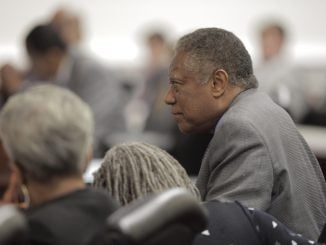By A.P. Dillon
RALEIGH — House Speaker Tim Moore and Senate Pro Tem Phil Berger have filed a motion with the state court of appeals for a hearing on the state’s voter ID law.
The motion calls for an en banc hearing, which is a procedural move requesting a rehearing of the case by a 15-judge panel — which would mean convening the entire state Court of Appeals.
Earlier this month, a three-judge panel ruled unanimously to block the state’s voter ID law. N.C. Court of Appeals Judges Toby Hampson, John Arrowood, and Allegra Collins reversed a decision issued last July by a three-judge panel from the Superior Court. That lower court panel ruled that the plaintiffs, which include the N.C. NAACP, had not presented evidence that would justify a preliminary injunction blocking voter ID before a full trial could be held.
“The all-Democrat panel ignored binding legal precedent, ignored exculpatory expert testimony, and absurdly concluded that it is unconstitutional for the legislature to enact Constitutionally-required voter ID legislation until some Republican legislators retire,” said a joint press release issued by Sens. Warren Daniel (R-Avery) and Joyce Krawiec (R-Forsyth).
The new motion filed on Tuesday, Feb. 25 seeks a rehearing with a new panel and makes the argument that the original panel made three errors in their ruling which blocked S.B. 824 from being implemented.
“The panel failed to adequately distinguish North Carolina’s voter ID law from Virginia’s and South Carolina’s laws — which were upheld despite the fact that both laws are stricter than North Carolina’s in many respects,” attorneys for state lawmakers wrote said Tuesday.
In addition, the motion says that the panel of judges who struck down the voter ID law based on claims of discrimination against African Americans erred again by completely ignored that S.B. 824’s primary sponsor, Democratic Sen. Joel Ford, is African American.
“The General Assembly still exercised its discretionary authority to allow exceptions from the constitutional voter ID requirement to ensure that all registered voters will be able to vote…there thus is no category of voters that is even theoretically prohibited from voting by S.B. 824’s terms,” says the en banc motion.
The motion states that “S.B. 824 is exceptionally protective of voters and compares favorably with other laws that have been upheld in the face of similar challenges.”
The motion also asserts the panel erred by “refusing to give the constitutional amendment sufficient weight.”
Last July, the Superior Court three-judge panel ruled that voter ID implementation could move forward and also dismissed five out of the six claims from the lawsuit, Holmes v. Moore.
The Holmes v. Moore suit was filed by the Southern Coalition for Social Justice in Wake County. The case challenged the legislation passed in support of a state constitutional amendment approved by voters in 2018.
By December, the case was back in court. The day after Christmas, Judge Loretta C. Biggs issued an injunction to stop the implementation of the S.B. 824.
Biggs granted the injunction order based on voter education efforts being made by the State Board at the time of the hearing on S.B 824.
Biggs was the presiding judge in the case and was appointed by President Barack Obama in 2014 to the District Court Seat in the Middle District of N.C.
The approval of the new version, known as S.B. 824, Biggs wrote was “procedurally unobjectionable,” yet she also claimed that were indications “that something was amiss,” because citing the replacement bill was passed not long after the original, H.B. 589, and that a number of the same legislators were involved in both bills.
In her ruling, Biggs said the state’s “sordid history of racial discrimination and voter suppression,” had “tainted” the voter ID law.
“We will not be deterred by judicial attempts to suppress the people’s voice in the democratic process,” House Speaker Tim Moore, (R-Cleveland) said in a statement at the time.
Moore said that the law as passed has generous exceptions for any “reasonable impediment” at the polls if voters didn’t have ID.
Lawmakers sought to have the ruling appealed, but Attorney General Josh Stein, a Democrat, said his office would not appeal before the March 3 primary. The case was then handed off to the state’s Court of Appeals panel, which ruled to keep the voter ID law blocked.
Not long after the panel ruled, Civitas Institute, a conservative think-tank, filed an ethics complaint against two of the panel judges, stating that Hampson and Arrowood should have recused themselves from the case because of prejudicial public statements about the voter ID constitutional amendment.
The statements in the ethics complaint come from a candidate survey conducted by the left-leaning Durham People’s Alliance in 2018.
Arrowood wrote in the survey, “I intend to vote against the Voter ID and Judicial Vacancy amendments.”
“I intend to vote no on each of the proposed amendments,” Hampson wrote.



